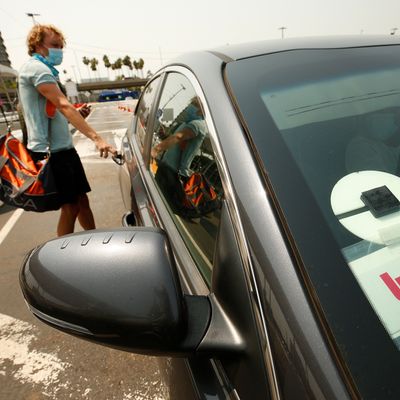
California’s Proposition 22, which passed with around 58 percent of the vote last night, will not be good for workers. The measure will classify gig laborers, such as drivers for Uber and Lyft, as independent contractors instead of employees, a move that locks them into a precarious position devoid of major labor protections like paid sick leave. But it’s not hard to understand why voters may have believed they were doing gig workers a favor. In the weeks leading up to November 3, Uber and Lyft spent over $200 million to convince Californians that Prop 22 would advance racial and social justice.
Ads in favor of the measure regularly featured people of color. As the Yes on 22 rolled through September, Uber purchased billboards in 13 major cities that read “If you tolerate racism, delete Uber.” Uber even emailed users to explain “Why communities of color support Prop. 22” using an op-ed from Alice Huffman, the president of the California NAACP. (CalMatters, a nonpartisan investigative website, later reported that Huffman’s political-consulting firm had received $85,000 from the Yes on 22 campaign.)
The successful campaign for Proposition 22 ought to force liberals, and elected Democrats in particular, to solve a problem they’ve helped create for themselves. What makes Yes on 22 so insidious isn’t just its outcome but the playbook companies used to win: empty social-justice rhetoric, which then can be filled with all manner of poison.
Huffman’s endorsement, the billboards, and the ads all belied a cynical reality. Most gig workers in California are people of color and immigrants, and to borrow some language from social-justice activists, their lived experiences are at odds with the stories that Uber and Lyft tell. The “flexible hours” that allegedly make gig work so attractive actually make it difficult for drivers to make ends meet, especially without labor protections or benefits. Drivers in the Bay Area are sleeping in their cars. Proposition 22 isn’t going to make them more secure: Though it does set a minimum wage floor, joint analysis from the National Employment Law Project and the Partnership for Working Families found that it would fail workers in other ways. It “does not explicitly protect immigrant workers from discrimination” and in fact “makes it harder for workers to bring discrimination claims against these companies by shortening the time a worker has to file,” the groups wrote.
Reality has a way of losing out to liars with big pockets. The Yes on 22 campaign was so intense, so manipulative, and so lavishly funded that corporations had labor groups and progressive activists at a serious disadvantage. Companies blanketed their low-wage, mostly minority drivers and delivery workers with in-app messages urging them to vote for the measure. This is coercion, not justice; the terms set by Proposition 22 tilt the balance of power firmly away from gig workers and toward employers. The implications will be felt far beyond California, too. In a statement, a spokesperson for Yes on 22 claimed the ballot initiative “represents the future of work in an increasingly technologically-driven economy.” He might be right — unless Democrats get in the way.
Some will probably try. Congressman Ro Khanna, the Democrat who represents Silicon Valley, is a critic of Proposition 22; Senator Kamala Harris, who may become vice-president, has said she opposes it too. The initiative overturns a previous court ruling in a case filed by the state’s Democratic attorney general. But the woke case for Proposition 22 also presents a major challenge for the party. The pipeline between the Democratic Establishment and Silicon Valley is strong. Take Valerie Jarrett, who serves a dual stint as an adviser to the Obama Foundation and a member of Lyft’s board of directors. Or Harris’s brother-in-law, Tony West, who is the chief legal officer for Uber. Anthony Foxx used to be Barack Obama’s Transportation secretary; now he’s Lyft’s policy chief. If Democrats want to be taken seriously as the party of working-class people, that pipeline has to close for good. But its very existence is a symptom of a more serious illness.
Democrats retain the support of the lowest-income Americans, and they’re eager enough to shake hands with unions. The party’s viability depends, too, on its ability to appeal to voters of color (and based on Biden’s apparent problems with Latino voters, it has no reason to assume that demographic changes work to its favor). But it’s not enough to tell people that you’re concerned about racial justice, that you want progress, that the policies you favor will be good for the poor. Anyone can do that. If you spend enough money, and coerce enough people, you can even make your story look like the truth. Uber and Lyft just proved it. So Democrats face a test of authenticity. If they mean any of the things they told voters this year, then economic injustice has to occupy a more central role in its policies and messaging. And class position is an overdue addition to the party’s concept of identity politics. Silicon Valley isn’t going to drop its war on labor, and gig workers need Democrats to fight back.






























